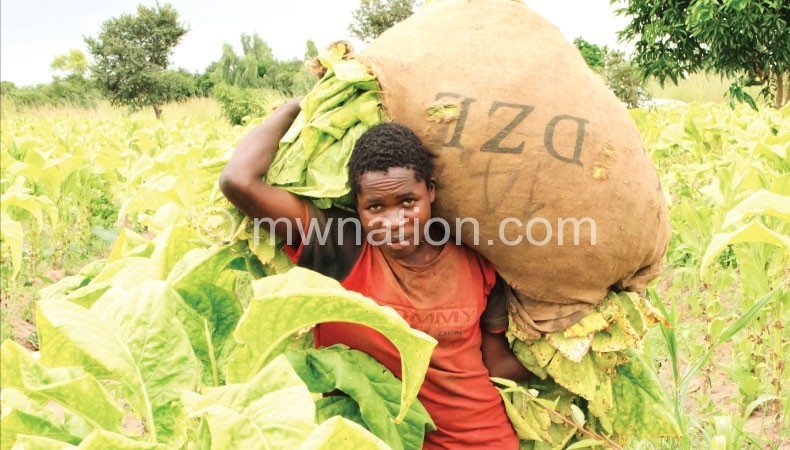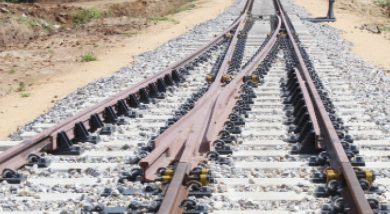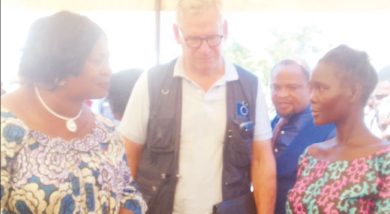Malawi tobacco growers see ‘white smoke’, puff up kwacha
Smiles, contentment and optimism were visible among tobacco growers yesterday at the start of the 2015 tobacco marketing season in Lilongwe which was characterised by better prices compared to the same day last year.
The Lilongwe Auction Floors opened at 8am with 2 007 bales of burley tobacco on offer and they were bought by Alliance One and Limbe Leaf Tobacco Company through both auction and contract systems.
However, the key highlight came when the first bale on the auction platform was bought at $2.32 (about K1 044) per kilogramme (kg), which was also the highest price tag during yesterday’s sales graced by President Peter Mutharika who arrived at the auction floors around 10.30 am.
Random spot checks on the floors showed that most price tags on the bales were above $1.20 (about K540) per kg, way above the minimum price set this year for burley tobacco of $0.85 (about K382.50) per kg.
A tobacco bale weighs 100 kg.
There was no price seen below $1 (about K450) per kg, much to the excitement of most growers The Nation spoke to.
The high leaf prices—while good to individual farmers—also have broader positive effects on the economy, especially the kwacha exchange rate against major global currencies.
The tobacco proceeds are expected to further strengthen the local unit in the short term, what with the recent balance of payment support (BoP) injections last month by the International Monetary Fund (IMF) that have helped to build reserves.
By March 31 this year, total forex reserves stood at $942 million or 4.93 months of import cover, which is one of the best positions in years and is well above the three months international minimum benchmark.
The IMF has provided an $18 million (about K8 billion) aid disbursement, which—according to investment and economic analysts at Nico Asset Managers—has helped to increase foreign exchange reserves, provide support for the currency’s value and ease the government deficit, albeit not to previous levels.
After crushing by more than 20 percent at some point last year on the back of donor aid freeze and the closure of tobacco markets in September, the kwacha rallied from December, taking the market by surprise as a government debt swap deal with PTA Bank poured in forex that shored up the local currency.
But analysts warn that in the medium to long term, the currency—even with tobacco proceeds—cannot escape depreciation as a widening current account deficit and weak investment inflows—take their toll.
But right now, tobacco growers are enjoying their 15 minutes of plenty.
“Izi nzosangalatsa amwene chifukwa fodyayu ndi wam’musi. [This is good news to us farmers because the tobacco fetching good prices is bottom leaf],” said Kondwerani Eliya, a grower from Kadyaudzu Village, Traditonal Authority Kalolo in Lilongwe.
He sold all his five bales of burley tobacco yesterday at $1.30 (about K585) per kg, which left him K292 000 richer.
Tobacco Association of Malawi (Tama) chief executive officer Graham Kunimba described the onset of the season as a “positive start”.
He also said the country’s oldest and biggest tobacco grower body expects an uninterrupted marketing season given that market suspensions owing to protests over prices may not occur this season.
The farmer is also benefitting from market forces as the better prices may be largely a result of low crop output against expected demand.
For example, the country is projected to produce 154 million kgs of burley—grown by a majority of farmers, especially small-scale ones—against a demand of 161 million kgs.
Speaking separately, Tobacco Control Commission (TCC) chief executive officer Bruce Munthali said TCC is excited at the quality of tobacco on offer so far.
Addressing a public meeting later at Kanengo, Mutharika said tobacco growers deserve good prices and warned merchants against colluding to offer low prices.
Mutharika also condemned illegal cross-border tobacco trade which, he said, deprives Malawi of potential foreign currency.





